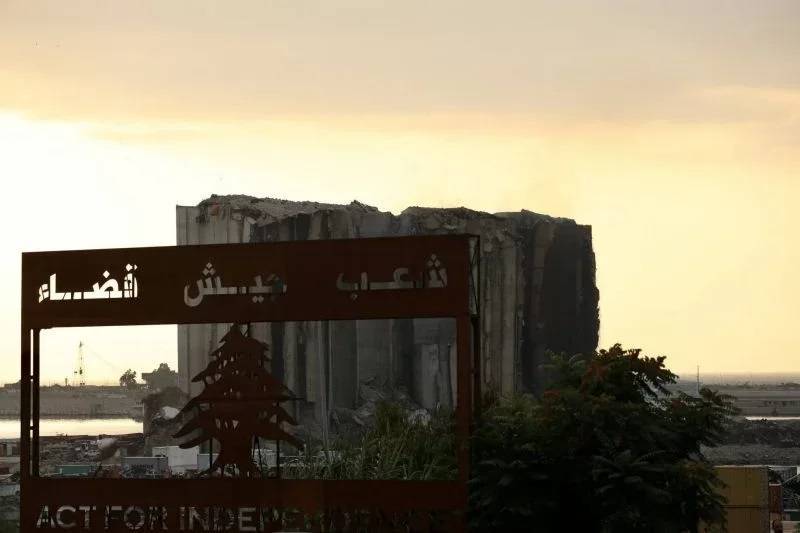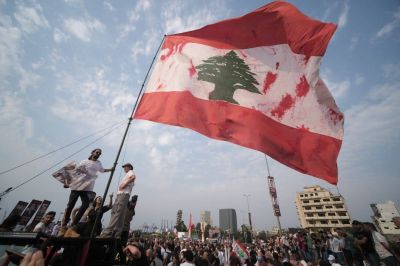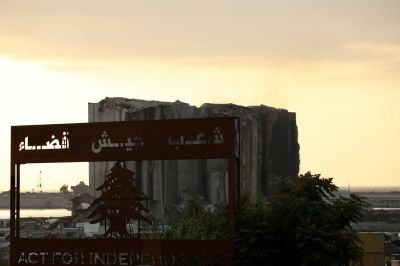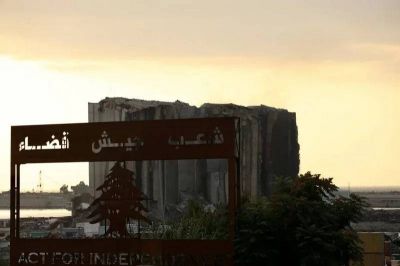
An installation representing the Lebanese flag with the slogan "People, army, justice" in front of the destroyed grain silos at the port of Beirut on July 31, 2022. (Credit: Archive photo Matthieu Karam)
Judge Tarek Bitar wants to continue his investigation into the Beirut port explosion at all costs, several judicial sources have told L’Orient-Le Jour.
Two and a half years ago, Bitar was tasked with leading the investigation in the Aug. 4, 2020 port explosion. However, he was only able to conduct his investigation for six months before political obstruction stalled his efforts. A few days before the third anniversary of the explosion, a senior judge who declined to be named due to the sensitivity of the case, told L’Orient-Le Jour that Bitar “is determined to complete his investigation sooner or later.” The source added that Bitar’s probe “seems three-fourths complete.”
“Despite the smear campaigns, moral pressure and threats to his life, he does not want to abandon the case unless the Higher Judicial Council and the justice minister who appointed him decide to dismiss him,” the source added.
One of the hurdles is a lawsuit filed in December 2021 before the Court of Cassation’s plenary assembly by former Minister Youssef Fenianos, alleging “serious faults” by Bitar. This court has not been able to rule on the lawsuit due to a lack of quorum since January 2022, following the non-replacement of judges on the court who retired.
On Jan. 23, 2023, 13 months after the onset of the deadlock, the judge tried to attempt to move forward: he decided to overstep the many complaints brought against him and to continue his investigation.
Bitar’s decision to resume the investigation [based on a legal interpretation of his role as an investigative judge] was accompanied by the initiation of proceedings against Lebanon’s top public prosecutor, Ghassan Oueidat. The day after the initiation of these proceedings, the latter responded by bringing an action against Bitar for “rebelling against justice” and “usurping power.”
The top prosecutor also instructed officials at the Court of Cassation’s Prosecutor’s Office not to implement any request made by Bitar. In judicial circles, the general view appears to be that to place this obstacle in the face of an investigative judge at the Court of Justice is “unprecedented.”
Tied hands
How, then, can the investigative judge carry out his mission? In other words, how can he issue an indictment when his hands are tied?
“An indictment cannot be issued before the completion of the investigation,” said a source at the Justice Palace. The source asked how it is possible for Judge Bitar to summon people involved in the case when the procedure for doing so must go through the public prosecutor’s office, to which he no longer has access.
Furthermore, the source asked, even if we assume as true the unlikely hypothesis that the investigative judge finished drafting his indictment without having completed his investigation, how could he come to the Court of Justice at a time when, according to the law, he must first submit it for an opinion to the public prosecutor’s office at the Court of Cassation, headed by Oueidat?
However, there is no sign that the tug-of-war between the two judges will be resolved any time soon. Although in early June, more than four months after Oueidat brought an action against Bitar, the president of the Higher Judicial Council, Souheil Abboud, finally appointed the First President of the Beirut Court of Appeal, Habib Rizkallah to look into this sensitive litigation, the latter has so far neither summoned Bitar nor given a ruling.
“Rizkallah’s examination of the case does not prevent the investigative judge from continuing his work,” a senior judge told L’Orient-Le Jour.
However, another senior judge disagreed, saying on condition of anonymity, that “Tarek Bitar can certainly check all the documents and all the evidence in his hands, he can also read and reread to fine-tune the conclusions he has already drawn, but he cannot collect new elements.”
The Beirut Bar Association
Although the end of the investigation does not seem to be in sight, the prosecution office at the Beirut Bar Association is not sitting idle. “In parallel to the investigations being halted, we have taken certain measures,” Youssef Lahoud, a member of the bar’s prosecution office, told L’Orient Le-Jour.
He pointed out that the Beirut Bar Association is following the precautionary seizure of the assets of those implicated in the investigation. “In 2020, sometime after the explosion, we managed to have the funds of the Beirut Port Authority seized, so that the companies that owe it money now pay it to the Beirut enforcement judge,” Lahoud said.
“Last year [in August 2022], a precautionary seizure order worth LL100 billion on the property of MP Ali Hassan Khalil was issued as part of an action brought against him for abusing his right to [defend himself] by arbitrarily filing complaints intended to hinder the investigation,” he said.
He also pointed out that the Beirut Bar Association had targeted MP Ghazi Zeaiter with a similar action, but that it turned out the land register had no property registered in his name. “In any case, we are working like a hive of bees to decide on the next steps to take,” said Lahoud.
He added that “the enforcement judge should soon instruct a court bailiff to visit the homes of those implicated in the investigation to make an inventory of the furniture to be seized.”
“It’s mainly a question of exerting moral pressure,” said the lawyer. “Seizures will only become final when there is a conviction.”
Lahoud added that the State Shura Council has published a report, in advance of the ruling it is due to issue shortly on the complaints lodged by the bar’s prosecution office against a decision by Interior Minister Bassam Mawlawi.
“While Judge Bitar was attempting to summon the politicians implicated, the minister [Mawlawi] decreed that they must be notified through bailiffs and not through the security forces, which made the judge’s task impossible,” Lahoud explained.
More generally, he said the Beirut Bar Association is working continuously to “try to obtain the rights of the victims and their families.”
“We meet every Tuesday, with the aim of reviving the case that we brought on behalf of more than 1,200 people,” he said.
“The culprits will not go unpunished. The issue is as important, if not more important, than that of depreciation of the lira, or the end of BDL's governor’s term of office, or the presidential vacancy,” said Lahoud. “It is about enshrining the rule of law through accountability.”
This article was originally published in French in L'Orient-Le Jour. Translation by Joelle El Khoury.



